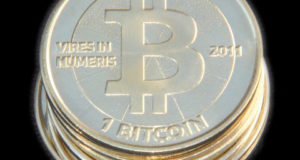|
Listen To The Article
|
 If you’ve been paying a lot of attention to the news lately, you’ve been hearing about something called Bitcoin. For those of you who haven’t heard of it, Bitcoin is supposed to be a digital currency that people can use to protect their wealth against inflation and government seizure.
If you’ve been paying a lot of attention to the news lately, you’ve been hearing about something called Bitcoin. For those of you who haven’t heard of it, Bitcoin is supposed to be a digital currency that people can use to protect their wealth against inflation and government seizure.
The basic idea is that Bitcoin is an alternative to government-created currencies. Unlike the U.S. dollar or the Euro, Bitcoin is purely electronic; there is no Bitcoin paper. Instead, it exists only in the virtual world; Bitcoin is administered by a private foundation, and it claims its encryption technology makes it safe to use.
The reason Bitcoin is attracting so much attention is that its value is surging; one Bitcoin unit rose to a high of more than 200 U.S. dollars on April 10, yet two months ago Bitcoin was worth only $20. What’s going on here? Most observers think that average people panicked by the European Union mandated seizure of bank accounts in Cyprus are looking for alternatives to government-backed currencies.
Other factors driving the rush to Bitcoin include the U.S. Federal Reserve’s policy of inflating money to keep interest rates low and the recent collapse in gold prices. People, it seems, are looking for an alternative to regular currencies.
Why Bitcoin May Not Be the Answer
Some people think Bitcoin might be a good alternative to regular currencies. I wouldn’t be so sure about that. There are some serious problems with Bitcoin; there is, after all, no way you can take it down to Safeway and buy food for your family. At the end of the day that is the point of money, isn’t it? Yes, you can sell your Bitcoin units for dollars online and then transfer it into a bank account, but that will take time.
Nor is Bitcoin as secure as its promoters have claimed; the media is reporting that Bitcoin platforms are being subject to denial of service attacks. The biggest Bitcoin trading platform, the Mt.Gox, was hit by a cyber-attack right after the news of the high value of Bitcoin hit the news. Some observers think this attack was staged in an attempt to disrupt trading and affect Bitcoin prices.
It is unclear who was behind the attacks—a strong possibility might be governments trying to protect their currencies. It is well known that the U.S. and other governments have extensive cyber warfare efforts; one of them might behind the Bitcoin attack in an attempt to disrupt it.
Bitcoin Is Vulnerable to Market Forces
Bitcoin is not a totally safe place to put your money; it is vulnerable to cyber warfare and to market forces. Remember the high that Bitcoin reached on April 10? Well, later that same day it suffered a crash, dropping the value to just over $100. It did rally the next day, returning to a value of roughly $160, but this behavior shows just how unstable Bitcoin can be. In fact, the recent behavior of Bitcoin looks like a classic bubble, and we all know that market bubbles collapse sooner or later. Something like the cyber-attack could send Bitcoin into a death spiral or at least deflate its value.
New book reveals gold-buying secrets that dealers don’t want you to know about…
Another problem is that major traders like George Soros can manipulate and disrupt something like Bitcoin fairly easily, just as they can also manipulate the currency trading markets. A particularly frightening scenario is that these traders can destroy a currency’s value in an attempt to profit from it. Almost all currencies are vulnerable to such market forces—so are precious metals such as gold.
Many people seem to forget that there is no real protection from the market. Technology isn’t going to protect you from the market any more than owning gold is. If the market destroys the value of currency, you’re going to be hurt by it even if you transfer your funds into Bitcoin.
A Greater Danger from Bitcoin
The real danger from things like Bitcoin and other electronic payment networks, including PayPal, MasterCard, Visa, and American Express, is that they can benefit the rich at the expense of average people. Wealthy people can simply transfer their funds into whatever currency or medium is safest or most profitable for them and leave the rest of us high and dry.
The rich person can move the funds first into his overseas account then into Bitcoin or back again. He will then have money to make transactions even if the dollar collapses, because he can simply use an Amex Gold Card linked to Bitcoin, Swiss Francs, or whatever to make transactions with. Joe Sixpack, who has his money in U.S. dollars in the local bank, could see all of his value destroyed by inflation.
The rich will still be able to fill the tanks of their Jaguars and buy groceries at Whole Foods. Average people will be standing in line at the food bank because their money is worthless. This scenario is already being played out in countries like Greece and Spain.
This scenario is also a perfect recipe for social unrest, as the events in Greece have proven. If a situation where currency is worthless but the rich can maintain their lifestyles develops, expect to see riots and violent protests in many of our cities. Angry mobs might be roaming the streets attacking Whole Foods and burning Mercedes.
What You Can Do to Protect Your Family
The most important thing that average people can do right now is to have a large supply of food and other essentials stored up so they can survive for a period of time if the economy collapses. The other is to make sure that as much of what you own is paid for as possible; this includes your house, your car, etc. That way you can at least weather the storm without losing your most valuable possessions.
The other really good piece of advice is to avoid gimmicks like Bitcoin. Bitcoin is simply too new and unproven to trust your family’s money with. There’s no guarantee that Bitcoin will be here next week or next year. Wait and see if Bitcoin is for real or not.
For average people, Bitcoin offers no advantages over more established electronic payment mediums like PayPal. Nor is it any better than the U.S. dollar, which is still one of the world’s most-used currencies. A standard savings account with U.S. dollars is a better alternative for average people, especially since it’s guaranteed by the U.S. government.
Alternatives to Bitcoin
If you are looking for an electronic alternative to the U.S. dollar, there are a couple of interesting ones out there. My suggestion would be to invest in a gold exchange traded fund, or ETF, like the Gold Spyder. This is a vehicle that invests your funds in gold, but you can sell it almost instantly online just like a stock. That way you can cash out quickly if you need to.
Another alternative some Americans might check out is the Canadian dollar. Canada’s economy is sounder than ours, and its currency has been a little more stable lately. So putting some of your funds in a Canadian bank might be a good alternative if you live near the border.
Another strategy is to store up a large amount of items that can be easily bartered for stuff your family needs in an emergency. Items that fit this bill include cigarettes, wine, hard liquor, whiskey, ammunition, tools, etc. Even having a large store of something like laundry detergent or diapers might help your family thrive in economic chaos.
Yet none of these alternatives is totally secure or safe. Average people need to learn that there is no longer such a thing as economic security and act accordingly. Only those that realize that the market is inherently unstable are going to survive and make a good living in today’s world.
 Off The Grid News Better Ideas For Off The Grid Living
Off The Grid News Better Ideas For Off The Grid Living




